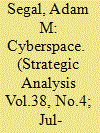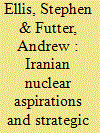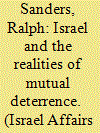| Srl | Item |
| 1 |
ID:
133609


|
|
|
|
|
| Publication |
2014.
|
| Summary/Abstract |
In June 2013, President Obama met with President Xi Jinping at Sunnylands, California. The meeting was seen as a chance for the two leaders to get to know each other in a relatively informal setting so they could address the growing mistrust between their countries. While maritime disputes, trade tensions and differences over how to contain the North Korean and Iranian nuclear programmes were high on the agenda, cyber security-in particular Chinese cyber espionage-was the defining issue of this unusual summit. For the US, the meeting between the two presidents was the culmination of a long campaign to pressure Beijing to reduce the scope and scale of Chinese cyber attacks on the United States.
|
|
|
|
|
|
|
|
|
|
|
|
|
|
|
|
| 2 |
ID:
142165


|
|
|
|
|
| Summary/Abstract |
With a few notable exceptions,1 it has become almost conventional wisdom to assume that a nuclear Iran is bad for its immediate neighbors, the wider Middle East region, and even the world.2 Such logic suggests that even an Iran with a nascent nuclear program would be emboldened in its meddling in Middle Eastern geopolitical affairs, present a serious, perhaps existential, threat to Israel and others, and could potentially lead to a nuclear-proliferation cascade among its immediate regional rivals. There is almost certainly some truth to these claims — and few people see an Iran armed with nuclear weapons as a good thing or something that should be welcomed. That said, much of the current debate has ignored or glossed over some of the other important geopolitical dynamics that have been driven by Iranian actions during the past decade: actions that have in fact been broadly positive for regional security and stability. As a result, if a comprehensive deal on the nuclear program cannot be reached by the June 30 deadline, the strategic implications of latent or even a nuclear-armed Iran may not be as catastrophic as some have suggested and more subtle than many fear.
|
|
|
|
|
|
|
|
|
|
|
|
|
|
|
|
| 3 |
ID:
086226


|
|
|
|
|
| Publication |
2009.
|
| Summary/Abstract |
In recent years Iran has emerged as Israel's most dangerous enemy. As things stand now, Iran is resisting the call of the United Nations to stop enriching uranium, the material used in making atomic bombs. Israel cannot take for granted Iran's claim that it will use its atomic power only for peaceful purposes. Moreover, the US National Intelligence Estimate of December 2007 that asserted, 'We judge with high confidence that in fall of 2003, Teheran halted its nuclear weapons program', has proved debatable. Experts point out that although Iran's warhead programme may have been stopped, its current uranium enrichment programme still has the potential to produce material for warheads in the future.1 Israel cannot base its policies on the controversial claims of this intelligence report and is attempting to convince the US that Iran is still trying to develop nuclear weapons
Nor can Israel assume that Iran will never launch a destructive first strike against the Jewish state. What can Israel do to avoid a possible Iranian nuclear 'final solution'?
|
|
|
|
|
|
|
|
|
|
|
|
|
|
|
|